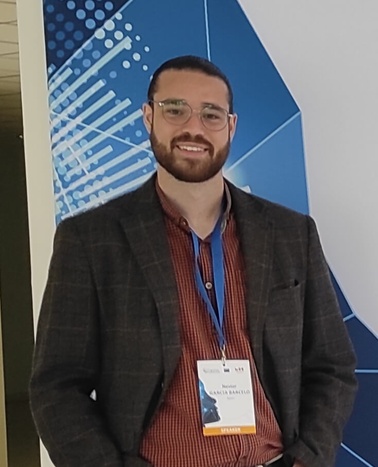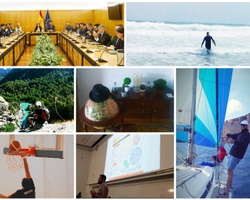
Néstor García-Barceló
My name is Néstor García-Barceló and I’m Spanish. I was born in Cartagena, although I have lived in Madrid for the last six years. In addition to working as a professor at IE University, I am currently a researcher at the Institute for Forensic and Security Sciences (ICFS) with the Autonomous University of Madrid (UAM), and I also work in collaboration with the Spanish National Missing Persons Centre (CNDES). When I’m not working or studying, you’ll find me socializing, spending time with family or playing sports.
"Hard work beats talent when talent fails to work hard."
The story of a passion waiting to be shared
It was Néstor’s profound interest in psychology and criminal behavior that inspired him to complete a bachelor’s degree in criminology at the University of Murcia. After kindling his passion for academia in Murcia, he moved to Madrid, where he completed two MA degrees. The first was in criminal investigation, criminalistics and crime scene, and the second was in criminal profiling.
His master’s program research explored the differences between single homicide and multiple homicide cases, analyzing how one might identify different indicative factors during an investigation. After graduating, he became a researcher in a project promoted by the national Secretary of State for Security (SES), in which he helped conduct an in-depth analysis of intimate partner homicides in Spain. After having completed this project, he launched a project investigating missing person cases.
Néstor is currently undertaking a PhD in Psychology at the Autonomous University of Madrid, while also working as an Adjunct Professor in the Bachelor of Behavior and Social Sciences at IE University. His specific areas of research are criminology and investigative psychology. He is especially focused on the application of behavioral sciences to criminal investigations. At present, Néstor is conducting a project which explores the identification of psychosocial, criminological and geographical factors which may indicate whether a missing person case is likely to result in homicide.
Thanks to his passion for rigorous work and objective analysis, Néstor has been made leader of a multidisciplinary team to help with his research in this field. The team is composed not only of academics (criminologists, psychologists, sociologists and more), but also of members of the Spanish law enforcement sector (national police and civil guard).
This research project consists of three main stages: firstly, they will review judicial and police information (sentences, case summaries, police investigation records, etc.). Secondly, the team will conduct interviews with people involved in such cases (the relatives or colleagues of victims and aggressors, and aggressors who are currently incarcerated). At this stage, the team will also conduct psychological autopsies of all victims. The final stage will be to develop multivariate statistical analyses.
The generation of this type of psychological study will allow police and criminal investigators to identify features and patterns in missing persons cases. Police will be able to create risk assessments and decision-support tools, which will help improve the initial responses to missing person cases on the part of law enforcement teams. Néstor hopes that through his passion and dedication, this potentially life-saving research will aid with the prevention of missing person cases. After having conducted his scientific research in this project, he is also hoping to promote social initiatives based on the evidence, to further aid with the prevention of such crimes.
Néstor is an extrovert and a very sociable person. He enjoys spending time with friends and family, and his hobbies include traveling, listening to music, playing the guitar and practicing sports. He especially loves to play basketball, sail and surf. Additionally, he has been a scout leader for 10 years, and enjoys leading outdoor activities in the summer, such as camping.
His pursuit of academic success within his field has solidified his belief that hard work is the fundamental key to success. One quote that he lives by, from NBA basketball player Kevin Durant, is: “hard work beats talent when talent fails to work hard.”
Although he has been researching and participating in conferences and meetings for years, as well as teaching in practice sessions in different universities, it was in 2019 that Néstor decided to take his passion for criminology further, and pursue a career as a professor. He chose IE University for its innovative environment and its focus on higher education in an applied, professional context.
The specific course he teaches is invaluable for students with a similar interest in this field. The rapid growth of the field of behavioral sciences has encouraged the use of tools from psychology and criminology to help solve society’s most pressing social issues. In law and behavior, students learn these tools to better understand behaviors regulated in criminal law and help public institutions like law enforcement agencies (LEAs) enhance their professional activities.
Specifically, in the classes for this course, students have a leading role, learning to manage research themselves. Students conduct simulations and practical activities such as developing criminal profiling expert reports, indirect personality and psychopathy assessments, and experiments about testimony among other activities. In this regard, they gain extensive knowledge about applications of psychology and criminology, which can be used to address real-world issues in courts, law enforcement and the criminal justice system.

